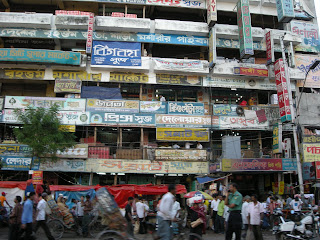So that was Christmas. And what have we done? Gone through countless military checkpoints; been stopped and questioned endlessly by plainclothes police; drank enough rice wine with Tripuras, Chakmas, Marmas (indigenous groups) to do permanent damage. Only in the Chittagong Hill Tracts. This is the bit of Bangladesh with hills, indigenous communities, Buddhist temples, endless parties, alcohol, and an insurgency that ended ten years ago. Naturally the military government is against all of the above, being generally a flat funless bunch intent on turning the country into a Joyce novel; a convent of austerity, self-repression, guilt, frustration and (to coin the title of a book) a quiet violence. The area is thus tightly controlled by checkpoints, restricted communications and constant police harassment which, I can tell you, puts an abrupt end to carol singing in the middle of the night on Christmas Eve. Farther Christmas would deliver here if he could get a permit I’m sure. On the bright side, of which there are many, this is by far one of the most stunningly beautiful areas I have ever seen and, rather snobbishly I know, there is an extra allure to the place because it is utterly undiscovered by any tourism. Jungle-clad hills swathed in mist rise and fall for as far as the eye can see.

The welcome we get in the Hill Tracts is always incredible and, as usual, we are treated as honoured guests and made to feel like part of the family. We enter the back room of one of the immaculate mud houses. The rice wine is poured and we sit chatting although we can already feel the weight of expectation building in the room. For this is a Tripura party and it is everyone’s obligation, nay duty, to perform something. I have, once again, been roped into bringing my guitar. You see, everyone is to bring something; Miriam dances, I sing and play the guitar, and Rich...well Rich claims he plays cricket. And so, with enough rice wine in the system to steady the nerves and fuzz the edges I play a local favourite: ‘Last Christmas’ by George Michael. This is followed by some Bob Dylan, a host of Tripura songs that I hopelessly try and play along to and an Irish song that I don’t really know other than it has to do with a bell in Belfast City but that I can build up to such a tempo with the clapping and dancing that everyone eventually collapses. There are bars over the windows and the local children look in. Plied with alcohol, guitar in hand, and currently sporting a beard I resemble a performing monkey or a missionary or a bizarre combination of the two.
We emerge blinking into the sunlight, half cut and full of food, so not really different to Boxing Day back home. Crossing a river, however, should only be undertaken sober. The things you learn. I've put some more pictures on my Flickr account just to make you more jealous. Happy New Year.











